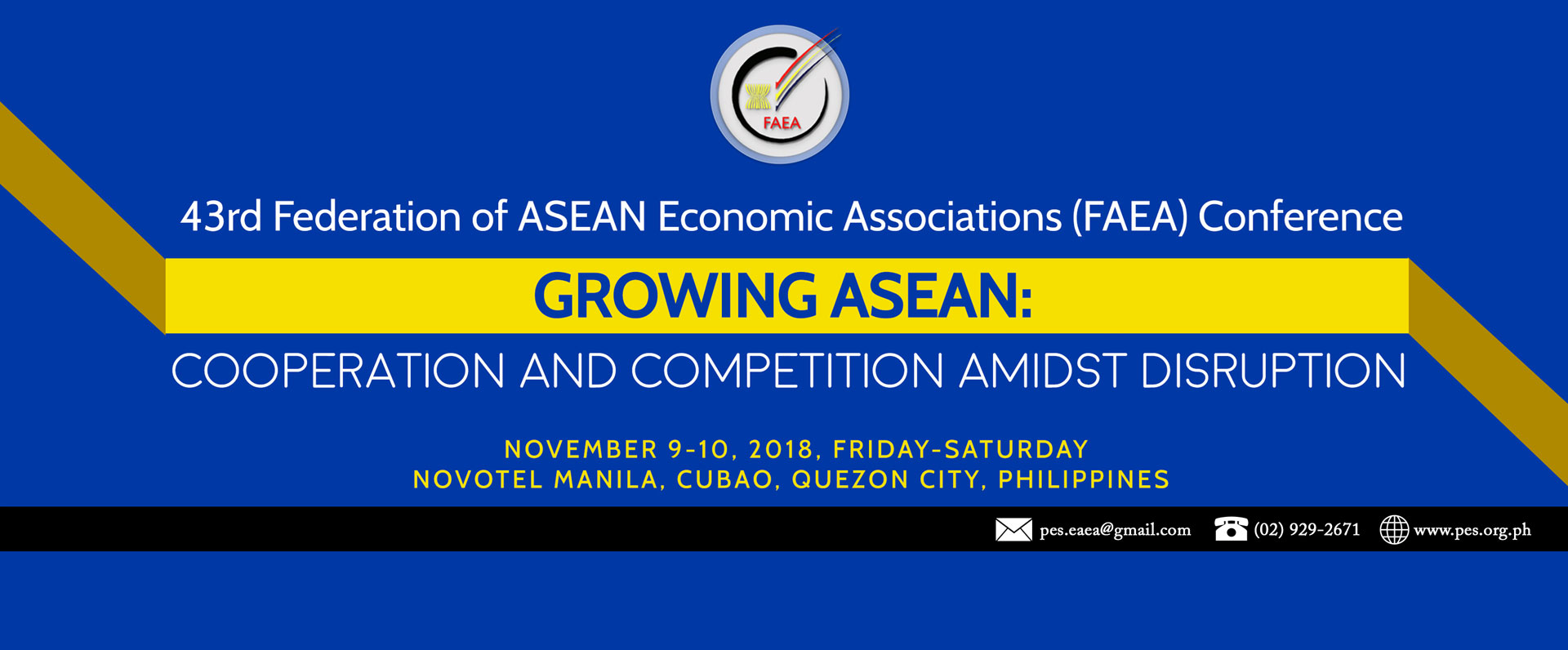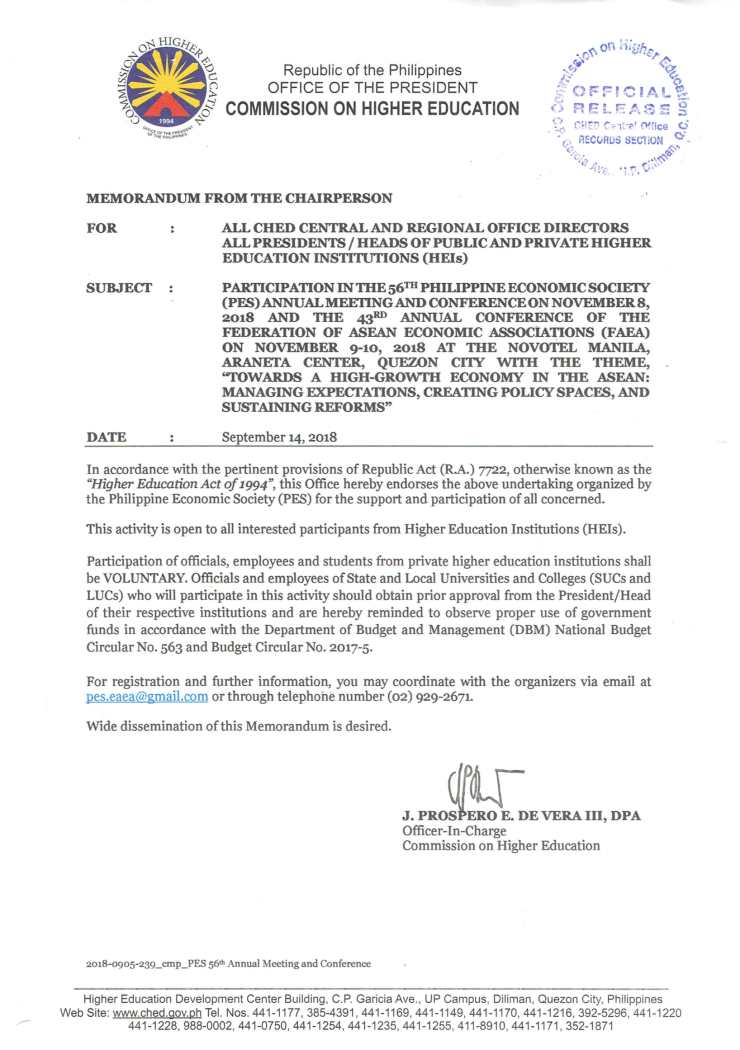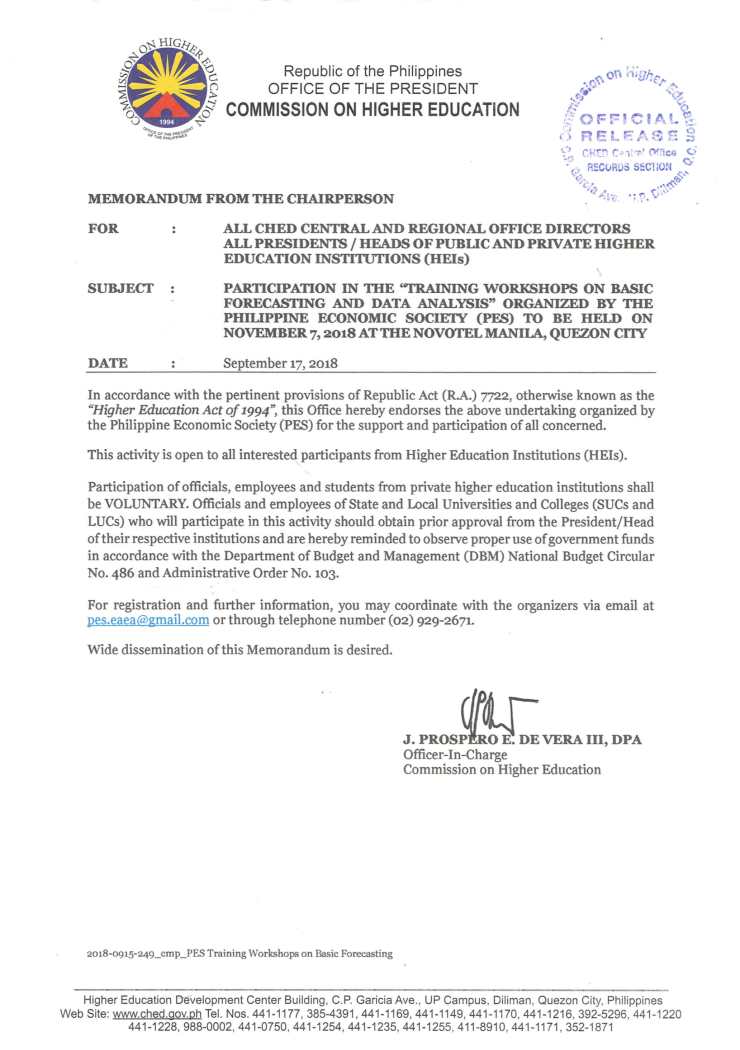
The Federation of ASEAN Economic Associations (FAEA) is a union of economic societies and associations in Southeast Asia and is currently comprised of the respective economic societies of Cambodia, Indonesia, Malaysia, Philippines, Singapore, Thailand, and Vietnam. It aims to promote the study of economics and its implications and foster cooperation in research and intellectual discourse among member countries.
The 43rd FAEA Annual Conference
Since its inception in 1967, ASEAN has become a force to reckon with despite the challenges it has experienced. It is now the world’s seventh largest market and third largest labor force. Given current growth projection, it is anticipated to become the fourth largest economic bloc by 2030.
The establishment of the ASEAN Economic Community (AEC) is yet another milestone in the economic integration agenda of ASEAN member countries. The AEC Blueprint 2025 highlighted the goal of having a highly integrated, cohesive, competitive and innovative economy; a resilient and inclusive ASEAN; and a global ASEAN.
With this vision in mind, ASEAN must overcome disruptions in the form of disruptive technologies, a resurgence of protectionist sentiments, digital economy, among others.
It is in the above context that the 43rd Federation of ASEAN Economic Associations (FAEA) Conference is framed with a theme on Growing ASEAN: Cooperation and Competition Amidst Disruption.
Program and Speakers
Keynote Address (Day 1)

Dr. Yasuyuki Sawada
Chief Economist
Asian Development Bank
Technology and Inclusion in Asia
The keynote address will discuss two closely-related challenges in Asia: rising inequality and the impact of technologies. As to the first challenge, growing income inequality is a global concern. Especially in the aftermath of the Asian and global financial crises, widened inequality has received a great deal of public attention. While income disparities across countries including Asia have narrowed significantly over the past several decades—thanks to the robust economic growth achieved by many low- and middle-income economies—, income gaps within countries, both advanced and developing, have widened. As a source of increasing inequality, there are a number of factors listed in the literature: 4th industrial revolution, globalization, and market deregulation. Notably, on the arrival of new technologies, demand for jobs that require non-routine cognitive tasks has grown faster than jobs requiring routine and manual tasks, widening wage disparities. A detailed analysis of selected Asian economies shows that over the past decade, wages have also grown faster in non-routine/cognitive types of jobs. This would create further income inequality. Hence, there are many ways in which governments can achieve inclusive growth. Supports to infrastructure investments are also critical in setting the “enabling” environment of inclusive growth.
Keynote Address (Day 2)
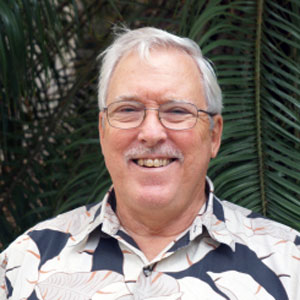
Dr. James Roumasset
Professor of Economics Emeritus
University of Hawaii, Manoa
Principled Populism: The Road from Disruption to Cooperation
Getting from division to cooperation requires making the best out of divergent ideologies. Right-wing populism seeks to boost the middle class through nativism while left-wing populists seek redistribution. Both are perceived to be protectionist. Both also see rent-seeking as the root of evil, but of very different types. Before finding fault with either philosophy, I attempt to put the best face on each, in the spirit of Charles Krauthammer and Andrew Natios. Finally, I will suggest how modest revisions in both views can promote greater domestic and international cooperation.
Click here to view a more detailed FAEA Conference Program.
For the details on the keynote addresses, click here on the following links:
Conference Registration
Register Now!
We invite you to join us at the 56th Annual Meeting and Conference of the Philippine Economic Society (PES) on 08 November 2018, to be held back-to-back with the 43rd Annual Conference of the Federation of ASEAN Economic Associations (FAEA) on 09-10 November 2018.
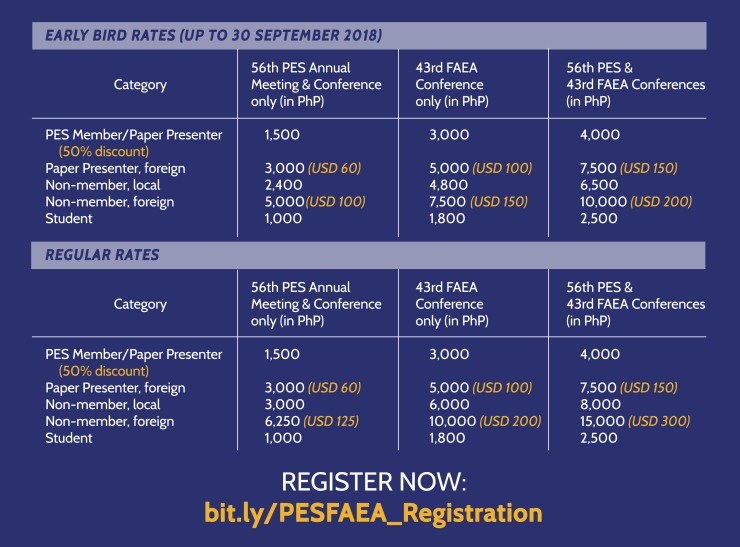
How to register:
STEP 1: Register online through this link. (The registration form is also accessible through bit.ly/PESFAEA_Registration.)
STEP 2: Pay the corresponding registration fee through the following channels:
- Online: bit.ly/PESFAEA_Payment
- Bank Deposit (Please send a scanned copy of your deposit slip to pes.eaea@gmail.com)
- Account name: Philippine Economic Society, Inc.
- Bank: BDO
- Branch: West Avenue-Del Monte Branch
- Account number: SA 408 009 8378
NOTE:
- To avail of the early bird rate, register AND pay on or before 08 October 2018.
- Conference fees are inclusive of a conference program/book of abstracts, conference kit, and meals.
Presentations
Plenary Session 3: Understanding Contemporary Sources of Disruption (sponsored by De La Salle University-School of Economics)
- How Are the Poor Boys in Conflict Areas? A Closer Look at 4Ps Boy Beneficiaries in Conflict Zones (Francisco A. Magno, Ma. Ella C. Oplas & Marites M. Tiongco, De La Salle University, Philippines)
- An ASEAN Digital Single Market: Building the Aspiration for a Single Market in the Digital Era (Paul John Mendoza Peña, De La Salle University-Graduate School of Economics, Philippines)
Plenary Session 4: Where Are the Women in ASEAN’s High-Growth Economies? (sponsored by Investing in Women, an initiative of the Australian Government)
- Women, women, women, where art thou? (Jose Ramon G. Albert, Philippine Institute for Development Studies)
Parallel Session A2: Issues and Challenges in ASEAN: Banking, Microfinance, and Governance
- Learning Curve Spillovers and Transactions Cost in the Microfinance Industry of the Philippines (Jovi C. Dacanay, University of Asia and the Pacific, Philippines)
Parallel Session A3: Economic Development and Growth
- Ranking the Relative Importance of Industry Sectors in the Philippines Using Hypothetical Extraction in Input-Output Analysis (Cyrus Paolo M. Buenafe, University of Asia and the Pacific, Philippines)
Parallel Session A4: Population, Aging, and Gender Issues
- Gender Gap on Formal Worker Participation in Indonesia: Trend and the Way Forward (Ema Tusianti, Abdurrahman & Suryo Adi Rakhmawan, BPS-Statistics Indonesia)
Parallel Session B3: The Impacts of Environmental and Energy Policies: Lessons from International Experience
- Revenue Decoupling for Electric Utilities: Impacts on Prices and Welfare (Arlan Brucal, London School of Economics, United Kingdom; Nori Tarui, University of Hawaii at Manoa, USA)
Parallel Session B4: Remittances and Foreign Direct Investments
- Behaviorism in Overseas Remittances? An Exploratory Multi-Disciplinal ‘Economic’ Framework (Jeremaiah M. Opiniano, The University of Adelaide, Australia)
- Foreign Direct Investment in Transition Economies and Vietnam (Bui Kieu Anh, Vietnam Institute for Development Strategies)
Parallel Session B5: Wealth Index, Decentralization, Credit Risk Ratings
- Measuring the Wealth Index Across Mindanao Provinces Using Principal Components Analysis (PCA) (Jamila Allana B. Valdez & Roperto S. Deluna, Jr., University of Southeastern Philippines)
Parallel Session C2: Energy and Environmental Efficiency
- Structural Shocks in Oil Prices on Sectoral Returns: Evidence from BRICS Countries (Kingsley Etornam Dogah & Gamini Premaratne, Universiti Brunei Darussalam)
Parallel Session C5: Trade and Technology
- Export Statistics and Technological Capability: The ASEAN Case (Kee Cheok Cheong & Shiau Ping Chew, University of Malaya, Malaysia)
- The effects of India and China on the production of sustainable palm oil in Indonesia: Towards a better understanding of the implications of power dynamics in regional value chains for sustainability (Yohanes B. Kadarusman, Universitas Prasetiya Mulya, Indonesia; Eusebius P. Pramudya, Institute of Social and Economic Research, Indonesia)
(Disclaimer: This page only includes presentations whose authors gave the PES consent to post online their respective presentations.)
CHED Endorsement
| Attachment | Size |
|---|---|
| CHED Endorsement - 56th PES Annual Meeting and Conference | 73.15 KB |
| CHED Endorsement - Trainings, 56th PES Annual Meeting and Conference | 65.22 KB |
 Philippine Economic Society (PES)
Philippine Economic Society (PES)